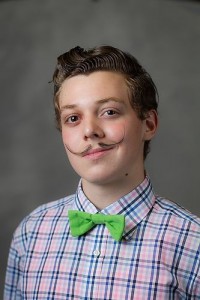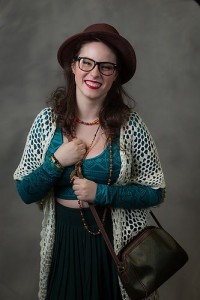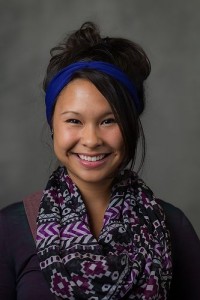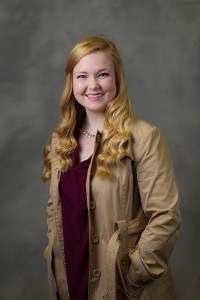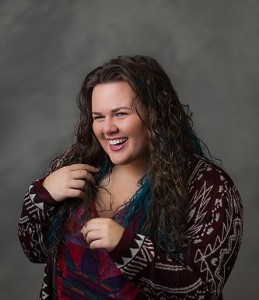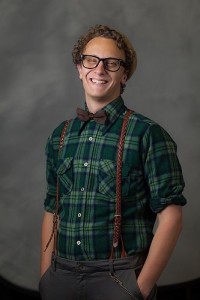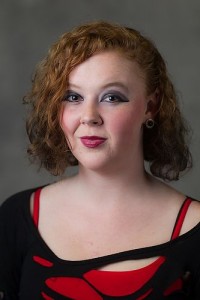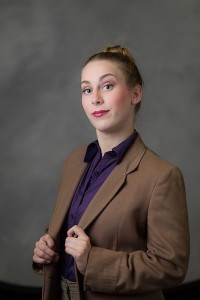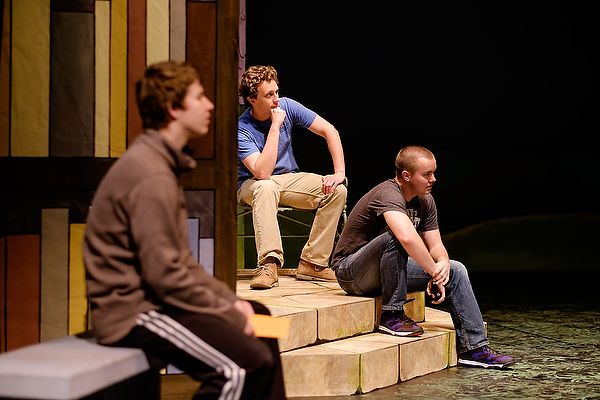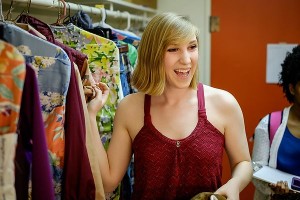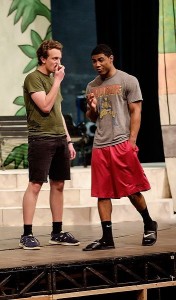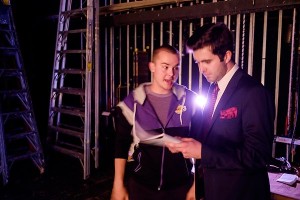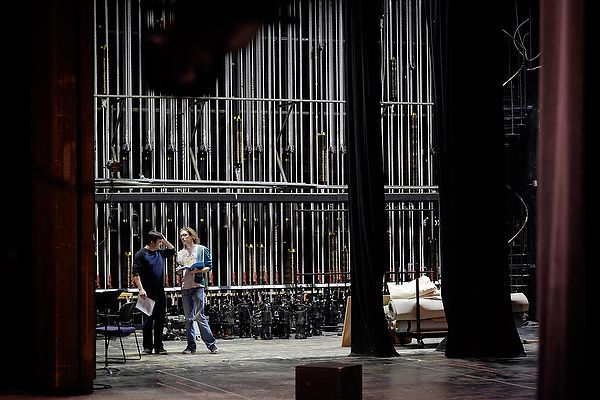 Opening night for the play is only five days away when an early-morning text message alerts the stage manager: The king is in the hospital.
Opening night for the play is only five days away when an early-morning text message alerts the stage manager: The king is in the hospital.
Sophomore Branden Cook, a football star turned actor from Matthews, North Carolina, is in the emergency room at Forsyth Medical Center. He has a lead role — the King of Navarre — in the upcoming Wake Forest Theatre production of Shakespeare’s “Love’s Labor’s Lost.” His throat hurts. He’s having trouble swallowing, and his head is pounding.
He follows up his text with an email to the cast at rehearsal late in the day: “I’m in the hospital bed going over lines with my mom. Hopefully I can get back ASAP so we can rock this show out!”
The play’s director, John E.R. Friedenberg (’81, P ’05), mulls the situation as he sits calmly in the lobby of Scales Fine Arts Center. He’s seen just about everything in his 27 years at Wake Forest. True, there are only three rehearsals to go, but why panic?
After two months of preparing to stage this play, after replacing one major character already, after cajoling students to memorize their lines, he can do little else besides wait.
THE KING IS IN THE HOSPITAL

This wasn’t in the script: L3 cast members cheer up their fallen King, Branden Cook. “We’re really concerned for Branden and for ourselves,” says freshman Erin Farmer. “We’re getting down to the wire.”
 It’s Martin Luther King Jr. Day, and the Scales lobby is empty, echoing. Those who think nothing is going on here today would be wrong. Jerf is in the house, waiting in the Ring Theatre.
It’s Martin Luther King Jr. Day, and the Scales lobby is empty, echoing. Those who think nothing is going on here today would be wrong. Jerf is in the house, waiting in the Ring Theatre.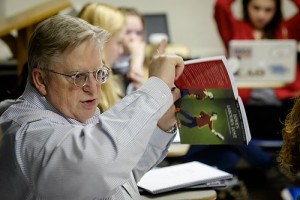
Hardly anyone on campus calls Friedenberg by his last name. He’s Jerf, which rhymes with Nerf, shorthand for his initials. He first roamed Scales as a student in the late 1970s. He made his mark working behind the scenes, notably as stage manager for Professor Jim Dodding’s version of the “Passion Play.” His resume ranges from T-shirt printer to country/rock band member to MFA graduate. In 1988, Harold Tedford (P ’83, ’85, ’90), the venerated theatre professor, invited Jerf back from a teaching position at a Georgia junior college to become theatre manager. Today, Jerf is director of University Theatre and associate teaching professor. This is his 10th play.
It’s common knowledge that students eye Jerf warily at first. With a sarcastic wit and a dry sense of humor, he can be intimidating. Behind his wire-rim specs, he gives little away. He is a compact man of few words, the king of one-liners — “Jerfisms,” as students call them. His politics are liberal, his Facebook posts prolific. Once students get to know him, they love him because the caring is mutual. His cherished alumni network extends coast to coast.
“God knows, I’m an acquired taste,” he says.
Dressed in his uniform of jeans and a long-sleeved casual shirt, he settles in on the second row of the Ring Theatre. Junior Andrea Anderson, the play’s stage manager, and senior Alex Dudley, the assistant director, join him.
“What if you give a party and no one shows up?” Jerf asks. He sips coffee, always lukewarm, from his ever-present thermos. By now Andrea is used to strange looks whenever she orders him coffee “that’s been sitting around a while.”
Lined up on the burgundy-carpeted steps outside the Ring Theatre are eager freshmen, experienced seniors, Presidential Scholars, theatre majors and psychology students. They want to act in “Love’s Labor’s Lost” for two reasons: Any actor worth his or her salt must act in a Shakespeare play; and any Wake Forest thespian with an ounce of sense and a bucket list wants to act for Jerf.
For four hours, 33 students walk through the doors in “American Idol” fashion, hoping to be the next King of Navarre or Princess of France. Jerf knows most of them, no introductions needed; no chitchat, either.
Each student must read two selections from the script, language that is unfamiliar and daunting, to wit:
“Great deputy, the welkin’s vicegerent and sole Dominator of Navarre, my soul’s earth’s god and body’s Fost’ring patron.”
Jerf observes intently and makes rough assessments about who might work in the cast. “If someone can’t act their way out of a wet paper bag, if I was Southern I’d say, ‘Bless their heart,’ but I’m from Connecticut.” This is his way of joking. Jerf is from Kernersville. In Jerfian terms, his boarding school years spent in Massachusetts count as Connecticut.
Seniors and buddies Alyssa Gera and Langdon Page walk into the theatre together. Alyssa grew up in the mountains of North Carolina, where her mother pronounced her dramatic and ferried her to her first audition at age 9. Without a clue what to do, Alyssa did an impression of Australian Steve Irwin, the late “Crocodile Hunter.” Jerf began recruiting her when she was 16. She knows the Jerf code, having mastered it years ago. “He’ll look at you for a second and then crack a smile,” she says. “Then he’ll stick his tongue out, and then he’ll chuckle, and that’s how you know he likes you.”
When Alyssa thought about transferring her first year, Jerf surprised her by paying a visit. She had not told him what she was considering, but, as is his habit, Jerf displayed his uncanny knack for divining what’s up with his students. “I hope you stay,” he told Alyssa. “But do what makes you happy. Follow your heart.”
Alyssa began her Wake Forest career in “Almost, Maine” directed by Jerf, and now she wants to bookend her college experience with him. She is known as dedicated, a leader who brings out the best in others. Acting, surprisingly, is not her immediate career goal. She wants to pursue arts management. L3, shorthand for the play, has a guaranteed place for her as assistant costume director. But if she wants to be onstage, she’ll have to prove herself to Jerf, again.
She has company in Langdon, who has something to prove, too. An arrow he drew on his script points to Berowne, a lord in the court of the King of Navarre and one of the stars of the show with the most dialogue. “I have an unhealthy desire to be this character,” he says later.
Growing up in Ohio, he was a ballet dancer with no interest in acting. That changed when, as a joke, he auditioned with a buddy for a high school play. He grew to love the feeling of being onstage and has stuck with acting despite a humbling experience. Two years ago Jerf cast him in “Noises Off ” but dropped him after several weeks of rehearsals. He had failed to learn his lines and lacked commitment. “I was crushed and hurt,” Langdon says, “but he was absolutely right.”
He recommitted himself to acting and overcame his parents’ objections to changing his major from physics to theatre. He remains a jokester — he collects comic books and is not averse to dancing in a thong in a student comedy show — but he’s serious about acting: “This is not a hobby. This is what I want to do.” He’s proven himself to other directors, but this is his chance to show Jerf how he’s matured and grown as an actor. “I don’t hold it against him,” he says. “I hope he doesn’t hold it against me.”
Fresh off a plane from Cleveland, Ohio, where he auditioned for an MFA program, Langdon performs, reading lines with Alyssa. Ever poker-faced, Jerf gives nothing away by the cryptic comments he repeats to aspiring cast members throughout the afternoon.
“What are you reading?”
“OK, can you do that again?”
“Thank you.”
Next.
Eventually the 33rd student arrives onstage. Sophomore Hayleigh Carroll, her dark hair flowing, is dressed in black leggings and an oversized sweater. Her history as an actor dates back to age 3, when she performed in church pageants as a sheep and a cow. She played a Munchkin in “The Wizard of Oz” in middle school and moved on to play a boy, a villain and a murderer in high school plays. “I’m not a flighty girl,” she tells me.
This is her 11th audition for a Wake Forest play. She has never been cast, but today she’s feeling lucky. Her Wake Forest application asked students to name their Top 10 list of their choosing. Hers consisted of Shakespearean characters, though none from this play. She loves Shakespeare. She has waited patiently for her shot — and takes it. Her view: “I would literally be a shrub or lay on the floor and be a rock.”
Hayleigh is barely out the door when Jerf has to make his first decision. Who will be invited for callbacks? He has a reputation for making quick casting decisions, sometimes skipping callbacks and banking on his initial impressions. Not this time.
“It’s like putting together a puzzle,” he says. “You find all the edge pieces and then it becomes pretty easy to fill in except that little piece that has the corner of the tree and the front of the boat.” He decides to sleep on it.
IT'S LIKE PUTTING TOGETHER A PUZZLE
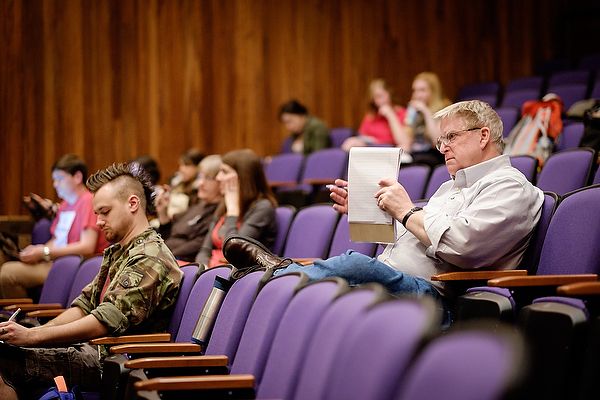
Jerf's advice for auditioning students: Be yourself. “You’re not the poor comedian who died and who can put on ‘Mrs. Doubtfire’ every day. Bring your craft to it, not your masquerade skills.”
It’s callback day, and is it ever frantic. Andrea, the stage manager, works like a theatrical air traffic controller, handing out scripts and switching students in and out of various roles and scenes. Students run on and off stage. There is no telling who’s who and who’s reading for which part.
For Jerf, however, it is no mystery. He’s seeing who can take direction, even at this early stage. He calls for more attitude from one student. Think about a show on Nick at Nite with a character who’s a smart aleck, he advises, using a saucier word. Bob Saget on “Full House?” suggests one student, aiming to help. He tells another group to drop the accents and talk normally. Imagine playing fraternity and sorority members who’ve graduated but are still hanging around. (Jerf was not a Greek.)
The students soon exit, leaving Jerf to make his final selections. Andrea asks whether he’s sure. Jerf is notoriously poor with names. He once cast the wrong student but made the best of it. Andrea lays out photographs for doublechecking. Hunched over her laptop computer, she prepares an email, short and to the point: 16 names beside 16 characters. One last question from Andrea: Do you want to sleep on it? Some directors might agonize over final casting, but not Jerf. Send it, he orders.
Across campus, students eating dinner or biding time in their dorm rooms await the email. Langdon and Alyssa are in the Pit. Score! They’re cast as the sparring would-be lovers, Berowne and Rosaline. Freshman Erin Farmer from Dalton, Georgia — the carpet capital of the world, she proudly proclaims — is cast as the confident Princess of France. Sophomore Branden Cook, good-looking and with a commanding stage presence, is cast opposite Erin as the King of Navarre. He played running back for perennial powerhouse Butler High School outside Charlotte, North Carolina — he has a state championship ring to prove it — until giving up football in the 11th grade to concentrate on acting. His King Ferdinand will be a prominent role.
Hayleigh Carroll, the sophomore who would settle for playing a shrub, opens the email in her room in the Student Apartments. She spots her roommate’s name, senior Beth Dodson. Beth will be Maria, one of the Princess’ ladies.
Hayleigh can’t find her name. “Maybe I read it wrong or skipped it.” She reads the list again. “Maybe if I close my eyes and blink, it will be there.” It’s not there.
Through the paper-thin walls, Beth can hear Hayleigh crying. She knocks softly on the bedroom door and goes in. “I know there’s nothing I can say to make it better, but can I give you a hug?”
The cast for “Love’s Labor’s Lost” is set — for now.
THE CAST IS SET FOR NOW

Strong auditions land freshman Tyler Johnson (far left) and junior Heather Sullivan (center) roles in their first MainStage performances. As the cast reads through the script for the first time, the mood is light. That’ll change soon, Jerf promises.
The play is real as the cast gathers for the first time in a second-floor seminar room in Scales. Assistant director Alex Dudley hands out copies of the 101-page, blue-bound script and promises, “I’ll give everyone $5 if you don’t lose your script.”
“Love’s Labour’s Lost” is one of Shakespeare’s earliest comedies, on the exasperating woes of bad timing. Ferdinand, the King of Navarre, and three of his lords pledge to fast, forgo their usual sleep and shun women for three years to focus on their studies. No sooner have they taken their vows than the Princess of France and her three lovely ladies arrive. The men’s oaths go out the window, rather secretly. Shakespeare filled the comedy with sexual innuendo, witty wordplay and a comic string of letters delivered to the wrong lovers. There are lots of puns, but limited action.
The students will perform an adaptation of the play by Appalachian State University’s Derek Gagnier. Jerf opts to set the play in modern times, hence the spelling of “Labor’s,” rather than the British “Labour’s.” He considered setting the action on a college campus, with columned fraternity houses as the backdrop. Instead, he and Professor Mary Wayne-Thomas, who is designing the set, chose a park-like setting, with symbols of privilege, wealth and power as backdrops.
Jerf sets the scene for understanding the characters. “These are the frat guys who haven’t stopped going to Putters,” he says. “Their world is Sandals, the all-inclusive resort. As you read this, you’re going to recognize these people. Some of them even live in Efird.”
Learn your lines, he commands at the end of this first session. L3 opens in 64 days, on Easter weekend. “Everyone needs a laugh on Good Friday,” he tells them.
A dusting of snow shuts down the Reynolda Campus one afternoon, but the cast of L3 files into a seminar room with sandwiches, snacks and drinks. It might as well be an advanced English class.
Playing King Ferdinand, Branden reads the play’s opening lines:
“Let fame, that all hunt after in their lives
Make us heirs of all eternity. …”
Jerf and the cast dissect the script line-by-line, sometimes word-by-word. “OK, what does that mean?” he asks repeatedly. “Do you understand what’s happening here?” They can’t simply read the words, let alone memorize them to suffice. They must understand the rhyme, the rhythm, inflections and pauses to convey Shakespeare’s 16th century humor to a 21st century audience.
With rehearsals just underway, Jerf faces his first crisis. The student playing Boyette, the messenger for the Princess of France, drops out for personal reasons. When word reaches Hayleigh, she begs Jerf to consider her: “I’ll cut my hair, bulk up, do things that aren’t physically possible.”
Jerf isn’t sold. He auditions other students and weighs his options. Hayleigh’s command of the language is impressive, but Shakespeare wrote the role for a man who flirts with the ladies and engages in sexual banter with the men. Can Hayleigh play a male? Should the role be rewritten for a female?
In the spirit of a holiday already past, he finally emails Hayleigh: “Will you be my val … I mean, my Boyette?” She says yes. No matter how belated, could there be a better Valentine for a young woman from Greensboro, North Carolina, willing to play a rock?
It’s the first night of four nights of “blocking.” This is when the cast figures out where to stand onstage, when to move and how to interact with each other. Jerf is popular with students for permitting them to improvise and rely on their instincts, at least initially. That’s happening as he hangs back, letting them do their thing.
A traffic jam ensues. Branden and his three lords enter stage right to welcome the Princess of France and her ladies to Navarre. The women enter stage left. There they all stand, awkward and in a straight line across the stage.
They try again. The princess and her ladies get tangled up simply trying to walk onstage.
Jerf pipes up: “I don’t need you standing there like a bunch of Girl Scouts afraid to knock on the door. Come on, girls! You’ve got Thin Mints. Everybody wants them!” The students howl.
The four men remain off to the side, sheepishly glancing over at the women, unsure how to approach them. Jerf ’s on a roll now: “It’s like a high school sock hop — the awkwardness, the flirting. You’re making eyes at each other.”
“You’re showing your age!” one student says. Jerf agrees. He’s 58, as he frequently tells the students and follows up with a quip about an old TV song, his prep school days or his summer church camp.
He watches each scene from midway in the theatre. Then he moves onto the stage to demonstrate a move, not unlike a basketball coach on the court. His directions prove succinct: “Counter that move;” “Cross over;” “Use your instincts;” “Don’t rush that.”
Langdon is working hard to impress Jerf. He has impossibly long monologues to memorize, but he is tackling them. “He gave me this role, and he’s letting me do it,” he will say later.
Jerf has ruled that Hayleigh will play Boyette, the princess’ messenger, as a man. She’s learning how boys walk and talk by watching her male friends. No one is in costume yet. Hayleigh is still dressed as a 20-year-old female college student, which makes her sexually charged banter as Boyette even funnier. “I don’t get a lot of boy talk,” she says. “I’m enjoying it.”
The play is coming together, but it is far from flawless. Jerf is headed to a theatre conference for a week. Spring break occurs the following week. Will the students stay on task without rehearsals?
OK, WHAT DOES THAT MEAN?
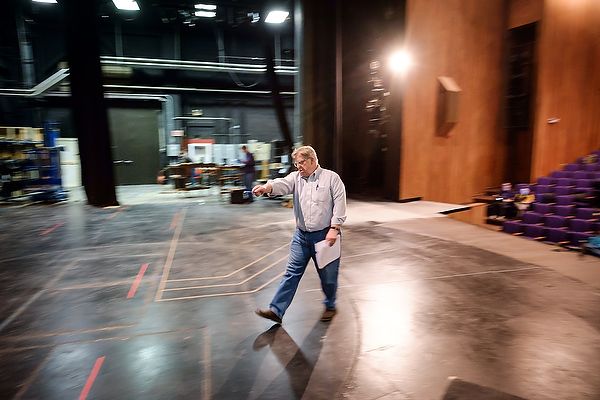
Shakespeare wrote the words, but it’s up to Jerf and the cast to determine every movement, every gesture onstage. “It’s in the theatre of my mind,” Jerf says. “I can’t tell you what I want you to do until I see it, then I can say ‘no,’ ‘no’.”
Others might be dawdling on their way back to campus from spring break in Florida or Cancun but not the L3 cast. It’s Sunday night. The actors already are at work, starting their string of 16 rehearsals in the next 19 days until opening night. Two weeks have passed since the last time they gathered.
“I can’t wait to be blown away by how all these characters have been developed during your fallow time,” Jerf says.
The cast takes the stage for a start-to-finish run-through, no breaks. Parts of the set are in place now — two sets of platforms and four benches — and the actors move easily across the stage, remembering their marks. Led by Alyssa’s sassy Rosaline, the women are feisty and confident and on task. The men? As the show progresses, they forget more and more lines.

Boyette, played by Hayleigh Carroll, addresses the Princess of France, Erin Farmer, and her ladies, played by Alyssa Gera, Alexa Erb and Beth Dodson.
When an actor forgets a line, he or she calls “line.” Stage manager Andrea reads the line. She also records it in her notes, which in this case, could serve as a demoralizing grade book for the evening. If an actor drops a word, paraphrases, confuses lines or jumps over someone else’s dialogue, Andrea notes that, too. Students were supposed to have memorized their lines a month ago. They should not need the script.
“Guys, you have to get off book, or there’s no point coming to rehearsal,” Jerf tells them, using the theatre term for shelving the scripts. He musters a pep talk as the students file out: “It wasn’t as bad as I thought it was going to be.”
That would come three nights later. Students arrive lacking energy and bereft of their usual fun. Some directors might scream or throw a chair. That’s not Jerf ’s style. He sends them home to learn their lines and get some sleep.
Alyssa stays behind. She’s terrified that the cast is not off book. They’re running out of time. “This is my last show, and I want to do as much as I can to make it a great show,” she tells Jerf. Trust yourself and your cast mates, he tells her.
She steps up, encouraging her cast mates: “A lot of people are relying on Jerf to do all the work for us, and that’s not how it works. Everyone has to put in an equal amount of work and time and dedication. If the entire cast is not focused, then it’s going to bomb.”
YOU HAVE TO GET OFF BOOK
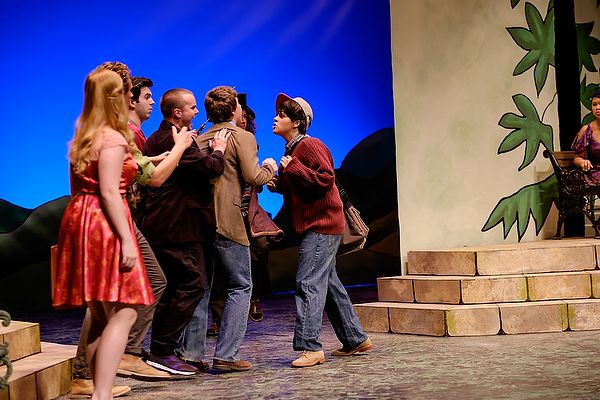
Sophomore Hayleigh Carroll (at right) fought for a role in L3 and donned seven layers of clothes, a wig and a baseball cap to become the Princess’ male courier.
In the words of Branden, the King of Navarre, everything is “finally clicking” in this last full week of rehearsals. With most everyone off book, they spend more time adding comic touches and developing their characters. Jerf has an idea when freshman Eli Bradley, playing the fastidious Spanish traveler Don Adriano de Armado, sits on a bench. Whip a handkerchief out of your back pocket and carefully spread it on the bench before you sit down, Jerf suggests, pulling a handkerchief out of his own back pocket.

Freshman Eli Bradley (left), as the pompous Don Adriano de Armado, and senior Brian Spadafora (right) as Costard the clown, deliver some of the show’s funniest moments.
Eli is confused.
“Do you know what a handkerchief is?” Jerf asks.
“I know about the concept,” Eli answers hesitantly. “I didn’t know people still used them.”
Branden has struggled with one of the most difficult monologues in the play, but he makes it through for the first time without calling “line.”
“How was it?” he asks.
“I was so nervous,” Andrea tells him. “I was crossing my fingers.”
“Good,” Jerf says.
Not for long.
Late on Friday night, just after rehearsal, Branden makes his way from his Poteat dorm room to Student Health Service. He’s battled a stomach bug and other ailments the last several weeks. His diagnosis tonight is mono.
He feels worse the next day. His roommate drives him to the emergency room at Forsyth Medical Center early Sunday morning. He tells the first nurse he sees: “I’ve got a show coming up.” She’s not optimistic.
He texts Andrea from the hospital. As stage manager and the one who has cheered him on, she has been his “lifesaver” during L3, Branden says. “Hey, I’m not sure what’s going on, but I’ll keep you updated.”
Doctors tell him he has an abscessed tonsil that might require surgery. Branden insists he’ll be fine after lots of liquids and some rest. A surgeon will have the final say.
Back on campus, the cast runs through the Sunday afternoon rehearsal. They’re worried about Branden and hopeful he’ll be back. Branden is feeling optimistic when he emails the cast to let them know he’s working on lines with his mom at the hospital and hopes to return “so we can rock this show out!”
Branden’s reign as King Ferdinand ends. Branden won’t need surgery, but the show will have to go on without him because the doctor advised performing could worsen the infection.
Branden is distraught. “I put everybody else in a bad position. Now they have to scramble to find somebody and then that person will be in a tough position. I feel like I let everybody down, and I don’t like doing that.”
There is a long-ago lesson that he is thinking about in the hospital bed. When he was in sixth grade, Branden was cast in his first play, as a card in “Alice in Wonderland.” Upset that he had only one line, he quit, without telling his mother. She wasn’t pleased. She taught him from that day on if he made a commitment he needed to stick with it. He tells me later, “My mother taught me, as a man your word is your bond. But she knew I couldn’t do it. If it was up to me, I’d be up on that stage.”
He can barely talk when he calls Jerf. It’s a short conversation; what is there to say? Replacing Boyette just as rehearsals had begun was difficult enough. But to replace a major character a week before the show? Jerf has never done that. He goes home with a headache.
When he returns to campus later in the day, Jerf sits in the lobby of Scales with several cast members seated on the green and orange ottomans. His look is “What? Me worry?” He has a plan. He’s asked an experienced senior to take the role. Until he receives an answer, there’s not much else he can do. “My options are what?” he asks.
“You could freak out,” one of the cast members answers.
That’s not Jerf ’s style. “It’s why I like taking public transportation,” he explains. “You just have to wait; there’s nothing you can do.”
Only three dress rehearsals are left before opening night. “Piece of cake,” Jerf says.
YOU COULD FREAK OUT

Word spreads quickly through the Scales Fine Arts Center when Branden is forced to leave the cast. Will the show go on? Alyssa doesn’t know whether to laugh or cry: “This may as well happen, we’ve had so many pitfalls and stumbles.” Langdon is terrified: “What are we going to do?”
Taylor Hagely is on his way back to campus from Hanes Mall with L3 cast member Jessi Wagner when his phone vibrates with a text message from Jerf: “Call me ASAP.” He has a pretty good idea why.
Jerf doesn’t waste words: Will you play the King? We’ll make it as easy for you as possible.
Taylor needs a couple of hours to think about it. A senior psychology major from Nashville, Tennessee, with model good looks, he’s respected and liked by other students. He knows everyone in the cast and has performed with many of them, including in a Shakespeare play. His first show was directed by Jerf. Working with him one last time is appealing.
He picks up a copy of the script from the theatre office and flips through it. He hesitates. In January, he skipped auditioning for L3. When Boyette dropped out, he passed again. He finished a student-directed play only the previous week. He wants nothing more than to lie by the pool at his apartment and enjoy the last month of his senior year.
Walking through Scales, he stops by the MainStage Theatre, where L3 will be performed. Photos and biographies of the cast are already posted in the hallway beside the doors. “I love every single one of these people,” he remembers thinking. “I don’t want to pass this up. It’s a chance to hang out with my friends for two weeks and perform.”
He’ll do it, he tells Jerf late that night. Then he reads the script all the way through. As he heads to dress rehearsal, he’s excited to see the play, for the first time.
It’s 6 p.m., 90 minutes until the play opens. Hayleigh climbs the stairs to the second-floor dressing rooms. To transform herself into Boyette, the male courier, takes about an hour. First come two sports bras and lots of duct tape, followed by a leotard, baggy jeans, an undershirt, an oversized shirt and a thick sweater. Then she dons a short, dark wig and baseball cap. For the last touch, she creates stubble on her smooth skin with makeup.
Langdon is in the lobby, waiting for his final play at Wake Forest. He’s grown considerably as an actor since Jerf cut him from “Noises Off.” They talked about it recently. “When I was leaving his office, he said, ‘I’m so happy I kicked you out of that show.’ I thought that’s a messed up way of saying it,” Langdon says laughing, fully understanding Jerf ’s point. “The best thing I can do now is have a good performance to say, ‘Thank you.’ ”
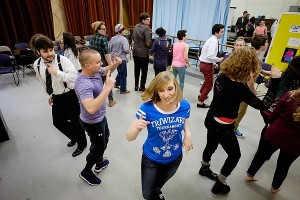 It’s 7:05 p.m., 25 minutes until the opening. In room 134, a rehearsal room just behind the stage, the cast is doing the hokey-pokey. Alyssa leads them through more vocal and stretching exercises to warm up. “It’s great to be alive,” she begins.
It’s 7:05 p.m., 25 minutes until the opening. In room 134, a rehearsal room just behind the stage, the cast is doing the hokey-pokey. Alyssa leads them through more vocal and stretching exercises to warm up. “It’s great to be alive,” she begins.
They stop when Jerf walks in. He’s added a black and gold windbreaker to his usual uniform of jeans and long-sleeved shirt. They give him a framed cast picture that they’ve signed. Pep talks aren’t really his forte, so he keeps it short. “Just be aware, it’s a tiny little house. Have fun. It’s your show.”
“We’ll make you proud,” Alyssa says, “or we’ll try.”
With that, he’s gone. He will watch all seven shows with the audience.
It’s 7:20 p.m., 10 minutes to show time. “Circle up,” Alyssa says, as she leads them through a final vocal exercise. Others join in:
“Jerf be with our show.”
“Focus be with our show.”
“Projection be with our show.”
“Shakespeare be with our show.”
“Family be with our show.”
“Friendship be with our show.”
“Langdon’s parents, who drove all the way from Ohio, be with our show.”
At 7:31 p.m., Taylor, the new king, enters stage right with his lords: Langdon, playing Berowne; senior Orion Goodman as Longaville; and sophomore Clint Blumenberg as Dumain. Taylor brings out King Ferdinand’s business side by carrying a black portfolio. The audience need not know he got the script four days ago and that this legal-pad holder contains a copy of the script. He doesn’t peek. He performs the opening monologue from memory:
“Let fame, that all after hunt in their lives
Make us heirs of all eternity. …”
The audience numbers only 92 people, but the laughs are plentiful. Branden, the fallen King Ferdinand, sits with friends on the last row. He was released from the hospital two days before. At intermission, he runs backstage, giving high fives. “You guys are so good,” he says.
YOU GUYS ARE SO GOOD
When junior Heather Sullivan auditioned for L3 in January, it was her 10th audition for a MainStage Theatre production. She, like Hayleigh, had never been cast. “Am I just not good enough?” she asked then about her past disappointments. Yes, she was good enough, she said: “It just hasn’t happened yet.” She persevered — “the 10th time was the charm” — and won the role of Moth, the page to Don Adriano de Armado, played by freshman Eli Bradley.
A tall redhead from the tiny North Carolina town of Trinity, near Greensboro, Heather, it turns out, stars in one of the play’s highlights. Halfway through rehearsals, Jerf added Ed Sheeran’s 2014 hit song “Thinking Out Loud” into the script. Heather sings the song as de Armado pines for his love, Jacquenetta, played by junior Sarah Fine. It’s a heartwarming performance, coupled with Eli’s humorous gestures and facial expressions. Before every performance, Heather has sung it backstage as part of the cast’s warm-up routine. Today, 10 minutes before the final show, she has trouble finishing it and wipes away tears:
People fall in love in mysterious ways.
Maybe just the touch of a hand
Oh me, I fall in love with you every single day
And I just wanna tell you I am.
Alyssa, standing beside Heather, is acting out movements to the song, trying hard to smile, but she, too, is fighting back tears. The entire cast sings the chorus:
So honey now
Take me into your loving arms
Kiss me under the light of a thousand stars
Oh darling
Place your head on my beating heart
I’m thinking out loud
Maybe we found love right where we are.
Maybe we found love right where we are.
As Heather finishes, the cast grasp hands in a tight circle. “We’re going to go out there and give this audience an awesome show,” Alyssa says. “Savor this. Savor this time we have.”
For the seniors — Alyssa Gera, Langdon Page, Taylor Hagely, Beth Dodson, Orion Goodman, Brian Spadafora and Jessi Wagner — it’s their final time to enjoy being onstage together. “We’ve been together since freshman year,” Alyssa says. “This is our last time playing make-believe together.”
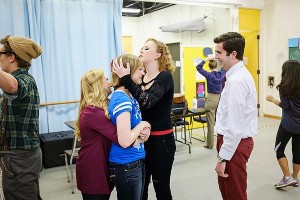 “Five minutes to places,” an assistant stage manager interrupts. Erin Farmer grabs Alyssa from behind and hangs on; Heather embraces Alyssa from the front. Alyssa’s makeup is running down her face.
“Five minutes to places,” an assistant stage manager interrupts. Erin Farmer grabs Alyssa from behind and hangs on; Heather embraces Alyssa from the front. Alyssa’s makeup is running down her face.
As the men head to their positions backstage, Erin uses a lint brush to clean Taylor’s blue blazer. Taylor doesn’t need the black portfolio. He has all his lines memorized.
Two hours later, after the ladies and Princess of France have flirted and parried with the king and his lords, after Heather’s heartrending song, after the applause and the bows, it’s over. The cast simply goes away to change out of their costumes. There’s no celebration, no grand speeches, no time to reflect on what they’ve done. Their job is to dismantle the set and carry the pieces back to the scene shop.
Jerf searches for Alyssa until he finds her putting away shoes in the costume shop. “Are you hiding?” he asks, giving her a hug. “Thank you,” they say to each other.
Much of L3’s action takes place out of the audience’s view. The characters fall in love but not before our eyes. The same might be said of the 16 students who brought Shakespeare’s story to life and forged memories and bonds they will carry forever. “I wasn’t looking for love,” Heather tells me, “but I found it here. You find love ‘right where you are.’ ”
In a Jerf play.
BACKSTAGE WISDOM
Two Wake Forest professors offer their perspectives on theatre’s magic
J.K. Curry
Chair and Associate Professor of Theatre
Q: What’s your favorite line from a play?
A: One of my favorites is “Do any human beings ever realize life while they live it? — every, every minute?” from Thornton Wilder’s “Our Town.” I like the line because it’s a reminder to pay attention and not just sleepwalk through life. I think the best plays can enhance our lives in many ways by encouraging us to examine our core values, look at the world in new ways, learn about people and situations outside of our immediate experience, and think about what gives life meaning.
Q: What play would you go see over and over?
 A: I don’t have an impulse to see one play over and over. I’m much more excited if I get to see a play (maybe one I’ve read over and over) that I’ve never previously seen staged. It is also exciting to go see a brand new play I know nothing about. When I do see a play I’ve seen before, I’m usually interested to see what a director, designers and performers will bring to the play and if they will help me discover anything new about the play. Seeing a play I’ve seen before can be just as enjoyable as rereading a good book — I’d just prefer to reread lots of old favorites, rather than rereading a single book 100 times.
A: I don’t have an impulse to see one play over and over. I’m much more excited if I get to see a play (maybe one I’ve read over and over) that I’ve never previously seen staged. It is also exciting to go see a brand new play I know nothing about. When I do see a play I’ve seen before, I’m usually interested to see what a director, designers and performers will bring to the play and if they will help me discover anything new about the play. Seeing a play I’ve seen before can be just as enjoyable as rereading a good book — I’d just prefer to reread lots of old favorites, rather than rereading a single book 100 times.
Q: What life lessons do students gain from acting in a play?
A: Beyond the value any of us can derive from reading or seeing a play, student actors can gain a great deal of empathy through actually embodying characters other than themselves. It is a valuable skill to be able to understand the motivations and appreciate the full humanity of people who are different from us. And, of course, students learn the value of deadline-driven teamwork. Performers in a play are highly dependent on their scene partners to appear at the right time, knowing their lines and business. When it works right, the individuals in a play can create something amazing together that none of them could do on their own.
Brook Davis (’90)
Associate Professor of Theatre
Q: What’s your favorite line from a play?
A: The first one that pops in my head is by one of my favorite playwrights, Tennessee Williams, from his play “Camino Real”: “The violets in the mountains have broken the rocks.” The other favorite that follows close behind is from “Angels in America: Perestroika” by Tony Kushner: “You are fabulous creatures, each and every one. And I bless you: More Life. The Great Work Begins.”
The Williams quote is beautiful to me because he spent most of his energy as a playwright talking about the poets and the misfits of the world and how they survive (or don’t) in our harsh society. This quote is triumphant in celebration of the power of gentleness and nonviolence over seemingly insurmountable harshness and obstacles. The Kushner quote is a blessing and charge to the audience following his epic play. The cast turns to the audience and acknowledges them, sending them out into the world to combat hatred and inequity.
I can’t read either of those quotes without getting a knot in my throat.
Q: What play would you go see over and over?
A: Almost anything by Tennessee Williams or Tony Kushner. I am also really in love with Samuel Beckett right now since I just directed “Waiting for Godot,” so probably that, too.
Q: What life lessons do students gain from acting in a play?
A: Empathy and collaboration. I think those are two of the most important lessons in life.


